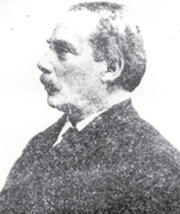Nachum Shaikevich
Nahum Meir Schaikewitz ( Nahum Meir Schaikewitsch , Nachum Meir Schaikewitzsch , Nuchim Meir Scheikewicz , Nachum Meir Schaikewitch , Scheikowicz etc .; pseudonym: Shomer or Schumer * 18th December 1850 in Nesvizh [ Nieswiez , Nieswiesh , Neswicz ] Government Minsk , † 24 November 1905 in New York ) was a popular, very prolific Yiddish author, best known as a writer of horror novels.
Life
After the usual traditional upbringing, Shaykevich came into contact with the Haskala , acquired a secular education, was cared for by his in-laws ("ass Kost"), continued to learn Russian, German and Hebrew, went to Vilna in 1872 and became acquainted with SJ Fünn who promoted him and inspired further literary work (stories).
In 1878, Shaykevich settled in Odessa and began to write plays and comedies for the Yiddish theater for Ossip Lerner's troupe using Goldfaden's method (he had met Goldfaden before in Romania and admired his activities) . Schaikewitsch soon put together his own theater troupe, which in Odessa successfully performed his own hastily dramatized novels ( The Jewish Prince , Der Baal Teschuba , Der Katorschnik , Der Percentnik , Dus unfaithful woman ) with the audience (around 1882, however, the troupe broke up because of internal disputes).
In the course of a few years, Shaykevich wrote about 200 novels and 40 plays in the factory, which were literally torn from his hands by the Jewish audience, especially the common people, the maids and business assistants. The novels are full of touching, today rather embarrassing scenes, supernatural-inexplicable, grotesque events and unexpected-improbable surprises. His characters, acting psychologically unmotivated, consequently lack any character or artistic-compositional credibility, so that, especially against the background of his mass production, he soon turned serious Yiddish writers such as Scholem Alechem , Rawnitzki, Dubnow and others against himself, who launched a campaign against him launched. These hostile activities as well as the ban on Yiddish theater in Russia prompted him to go to New York in 1888, where he continued his novel and theater production and also edited various magazines or contributed to them as a writer or editor ( Der Yiddischer Fok , Der Land Chuchem , The philanthropist and many more).
Nachum Schaikewitsch had a son and three daughters, all of whom remained connected to Yiddish literature: Abraham Schumer (born in 1876 in Pinsk), Mirjam (born in 1882 in Odessa, married Schumer Zunser), Rosa (born in 1887 in Odessa) , Chane (born in Odessa in 1889).
meaning
According to Shaykevich's significance in literary history can be seen primarily in the fact that, like Dick , he created a Yiddish reading audience among the ignorant Jewish masses in the first place, which was then receptive to secular literary products of higher quality.
A bibliography of his enormous production (much has also been translated) has not yet become known.
Selection of works
With a known release date:
- Gan Eden - Vögale , 1878 (novel, 6th edition 1914)
- The Iron Woman or the Sold Child , Wilna 1882 (novel)
- The Cherem , Warsaw 1883 (novel)
- The Baron de Aguilar , 1883 (novel, 3rd edition 1890)
- The Podraczik , Warsaw 1884 (novel)
- The Egyptian Haman , 1889 (novel)
- Golus Portugal , 1889 (historical novel)
- Man - God , 1889 (historical novel)
- The last Jewish king , 1889 (historical novel)
- Esterka, the Polish-Jewish Queen , 1890 (historical novel)
- Baron Rothschild , 1890 (novel)
- Titus , 1891 (novel)
- Rabbi Jehuda Halevi , 1892 (novel)
- The great millionaire , 1893 (novel)
- The American Glicken , 1895 (novel)
- Captain Dreyfus , 1898 (novel)
- Secret Jiden , 1901 (novel)
- Life picture with singing , 1909 (play)
Without year / not determined:
- The pious murderer (novel)
- The Baal Teschuba (novel)
- The beautiful Rachel (novel)
- Between Man-Eaters (Stories, New York, 26 volumes)
- The blind Jesoime or between tigers (novel)
- The poisoner ( short stories, 12 volumes)
- The reckless (play)
- The Gold King (play)
- Haman, the Second (play)
- Shoshana or the Judge of Jericho (play)
- Die Judenfresser or The Baptized Queen (play)
- The Jewish Count (play)
- The Grine or the Cousin in America (play)
- American Yiddishness (play)
- A Yiddish child (play)
- The Jewish Emigrants (play)
| personal data | |
|---|---|
| SURNAME | Schaikewitsch, Nachum |
| ALTERNATIVE NAMES | Schomer |
| BRIEF DESCRIPTION | Yiddish writer |
| DATE OF BIRTH | December 18, 1850 |
| PLACE OF BIRTH | Nyasvish |
| DATE OF DEATH | November 24, 1905 |
| Place of death | New York City |
